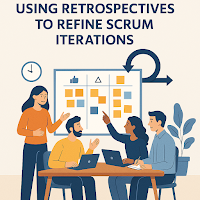What you are doing and what you are learning does not exist in isolation but as a part of a wider context. Paraphrasing the well worn marketing tip "Our customers do not want drills bits they want holes", that is, smaller goals exist to further larger goals. Periodically zoom out to that wider context and re-assess based on what you have learned.
Does what you have learned during your first attempts mean you need to change
The theoretical framework you use to understand the topic
The learning techniques you are using to master the topic
The skill you are learning e.g. whether learning this topic will still help you meet your wider goals or do you need to change to learning a different skill.
The Pivot
Double Loop Learning in My Own Career
The Case of the Endless Iterations
Note:
- a sprint or iteration is a fixed period or timebox which developers use to help plan their work (it is usually 1 to 4 weeks)
- a backlog is a todo list of work items used for planning
- a burndown chart shows how quickly work items are getting done.
One of the teams I was coaching was having three problems
- They kept abandoning work items they had committed to during backlog refinement and sprint planning, changing their minds from sprint to sprint about the backlog.
- They were accomplishing work at the start and end of sprints but nothing was happening in the middle.
- They kept on wanting to extend the sprint, claiming they had not finished the work.
- Your work items are too big, The majority of items should take a day or less with a one week sprint, while you can get way with larger items with a longer sprint.
- Your sprint ceremonies are inefficient, dragging on, causing you to be bogged down with administrivia
- Your testing, integration and delivery pipeline has long delays and onerous manual steps, reducing productivity.
- The team had an easier time predicting what they would do in the next 5 days instead of the next two weeks. Abandoned work items dropped by a factor of twenty.
- The flat horizonal section in their burndown chart disappeared. They were getting things done throughout the sprint instead of just at the beginning and end.
- They stopped asking to extend the sprint, because it felt more acceptable and less of a big deal to just add uncompleted work to next weeks sprint. Sprints were less intimidating.
Articles
- Double loop learning a concept and process for leadership educators
- Double loop learning (Wikipedia)
- The plan–do–check–act cycle (Wikipedia)



